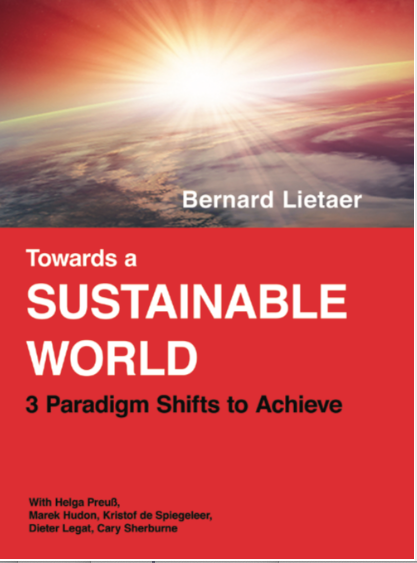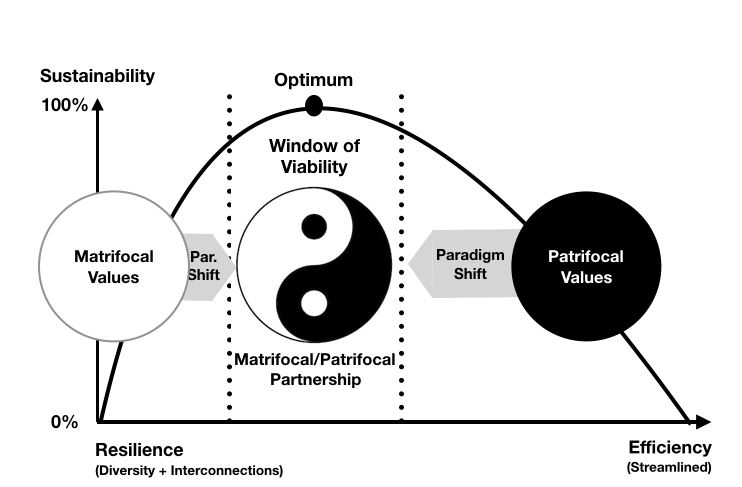
– see purchase options below.
In his last book, “Towards a Sustainable World”, written just before he died, Bernard Lietaer calls for three paradigm shifts – requesting specific actions by individuals and leaders:
1 – Understand and recognize the „Law of sustainability“.
2 – Bring our cultural system back to balance of matrifocal and patrifocal values.
3 – Complement our presently centralized management of information with solutions granting private ownership of such information.
1. A new frame of mind:
Together with Sally Goerner and Robert Ulanowicz, Bernard Lietaer had distilled a concise definition of sustainability from systems theory and theoretical ecology: “Sustainability is a network‘s capacity to sustain flows of energy, matter and information”

This definition (published in academic journals in 2009/10) is a major breakthrough, a new frame of mind. It applies to all kinds of systems – forests, resources, investment, monetary systems, and it identifies one single indicator of performance: flow.
For this, any system needs to balance two characteristics: efficiency and resilience. The latter is where our current systems, and thinking, falters. Resilience stems from diversity and inter-connectivity, and focusing on those two, instead of ever further efficiency gains, will bring our human systems back into the window of viability, where natural systems strive.
2. Achieving sustainability as a society
In our society, the characteristics of efficiency and resilience correspond to archetypical sets of values: Bernard Lietaer named them “matrifocal” (focused on a societies’ resilience) and “patrifocal” (focused on its efficiency). These terms might seem a little unusual or strange, but Bernard could not find other terms that were clear enough to communicate his meaning.

There must be some focus on patrifocal values of efficiency; for instance, to wisely use a societies’ resources or to cope with imminent danger like an attack from for a hostile society or of the effects of climate change.
And of course, all societies need to also focus on matrifocal values – otherwise vitally important matrifocal functions such as raising and educating children, caring for the elderly, or community and volunteer activities, would not exist. A society completely lacking matrifocal values would therefore soon collapse.
Actually, as a global society, we are making progress toward this paradigm shift in many cultures. Compare our grandmothers’ situations in their societies to the positions our daughters have today:
- Women are much better educated now; and in some countries, the majority of students are female – the first time this has occurred since the 13th century.
- More women are in leadership positions now – in politics, public administration and business.
These developments indicate that we are starting to bring out more and more matrifocal values and that the paradigm shift towards a more balanced matrifocal/patrifocal partnership has started. Great start – but much more is required to achieve true balance.
3. Unconstrained flow of information is essential
Flow of information free of constraints is essential for living systems. To underscore the importance of unconstrained flow of information in human societies, the Universal Declaration of Human Rights (UDHR, Article 19) recognizes the importance of freedom to seek, receive and impart information as a human right. The same is acknowledged in the International Covenant on Civil and Political Rights (ICCPR).

But businesses have found ways to make money from the human information system. For that purpose, the obvious design for information systems was to centralize them – taking possession of people’s proprietary information by centralizing their flow in large data centers.
Not only that: To pass information between users as “search results,” they filter out what they don’t want us to receive and amplify what they want us to see. This happens on a large scale in our most frequently used communications tool, the Internet. By this process, the Web actually constrains sustainability of the human information system.
Checking the human information system against the law of sustainability, Bernard Lietaer demonstrates how our human information system falls into the efficiency corner, making our society increasingly vulnerable to instability and political crisis. To ensure sustainability of the human information system we need a significant paradigm shift – to recover from this dramatic change in the use of information by third parties.
Awareness of this necessity is growing – but we need to reverse this trend to avoid paying a high price for the consequences of continuing in the wrong direction!
Order the book from your local bookshop. If they cannot get it delivered, you can try these online options:
in the U.S.A.: Powells – in Austria: Falter – in Germany: Medimops – in the U.K.: Bookshop.org
If all else fails, you can get it delivered worldwide from Amazon, where you can also download the e-book version.